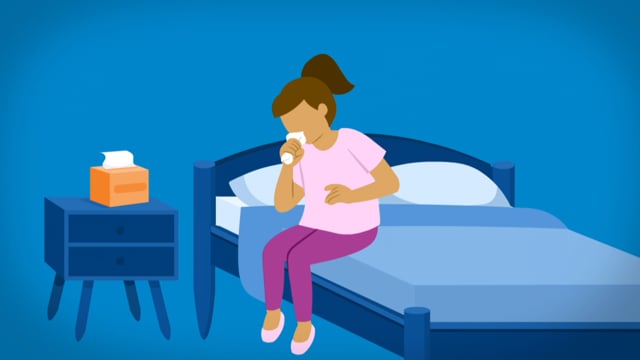Tips for Treating the Flu
What Is the Flu?
The flu (influenza) is a very contagious viral infection of the respiratory tract (nose, throat, and lungs). The flu can make someone feel pretty sick for up to a week.
How Is the Flu Treated?
The flu usually doesn't need medical treatment. Sometimes, doctors might prescribe antiviral medicine for some people who have the flu. This medicine works best if given within the first 2 days of the illness. It can make flu symptoms milder and shorten the illness by a couple of days. But it has some side effects, so discuss the pros and cons of taking it with your doctor.
Doctors don't prescribe antibiotics for the flu. Antibiotics only work against bacteria, not viruses.
How Can I Help My Child?
If your child gets the flu:
- Offer plenty of liquids. Fever and appetite loss are common with the flu, and can lead to dehydration.
- Encourage your child to rest in bed or on the couch with a supply of magazines, books, quiet music, and perhaps a favorite movie.
- Dress your child in layers that are easy to add and remove during bouts of chills or fever.
- Give acetaminophen or ibuprofen for fever and aches. Do not give aspirin unless your doctor tells you to. It has been linked to a rare but serious illness called Reye syndrome.
- Give over-the-counter cough or cold medicines to children over 6 years old if your doctor says it's OK. Follow the package instructions carefully so you give the right amount. Do not give these medicines to children under 6 years old because they can cause bad reactions.
- To help with coughing, you can try:
- a teaspoon of honey for children over 1 year old. Do not give honey to children under 1 year old.
- a mentholated vapor rub on the chest for children over 2 years old. Follow the directions on the package.
- Running a cool-mist humidifier can help relieve coughs and runny or stuffy noses. Clean it after each use or at least once a day.
- For a stuffy nose:
- For babies: Put a few drops of saline (saltwater) into the nose, then gently suction the mucus out with a bulb syringe. Do this no more than 2–3 times a day so that the inside of your baby's nose does not get swollen or sore.
- For older kids: Give 2 sprays of saline nose spray 3 times a day.
Get medical help right away if your child has any trouble breathing. If your child has other symptoms that seem to be getting worse, or not getting better, call your doctor.
What Else Should I Know?
Take care of yourself and the other people in your family. If you haven't already, speak to your doctor about getting the flu vaccine for you and other family members. It's recommended yearly for everyone older than 6 months of age. Also, wash your hands well and often, especially after picking up used tissues.
If your doctor prescribes medicine to ease symptoms, call the pharmacist before you go to pick it up. In a severe flu season, some pharmacies might have trouble keeping the medicines in stock.
Kids who are sick should stay home from school and childcare until they:
- feel better
- have been fever-free for at least 24 hours without the use of a fever-reducing medicine

Does my child need an antibiotic?
Find out if antibiotic medicines will help your child feel better – or if some TLC is all that’s needed.
Reviewed by: Larissa Hirsch, MD
Date Reviewed: Sep 22, 2025















